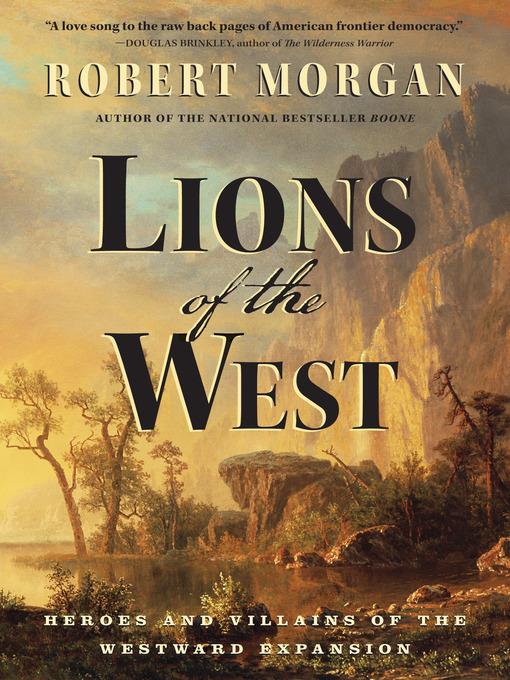
Lions of the West
کتاب های مرتبط
- اطلاعات
- نقد و بررسی
- دیدگاه کاربران
نقد و بررسی

August 1, 2011
Morgan has made the Old West his preserve with the novel Gap Creek and a biography of Daniel Boone. Here he covers considerable ground, both geographical and temporal, tracing the lives of 10 Americans who played significant roles in the country's westward expansion. Morgan's focus is on their personalities and exploits in securing the West, not in their roles as politicians, which leaves him with a somewhat one-sided portrait of Andrew Jackson. But in general he builds well-rounded portraits, beginning with Thomas Jefferson and the seminal exploration of Lewis and Clark, and ending with John Quincy Adams, a critic of the western expansion until his death in 1848. Three chapters on the Mexican-American War focus on three individuals involved in the controversial but successful endeavorâPresident James Polk, Gen. Winfred Scott, and the lesser-known Nicholas Trist, chief negotiator of the final treaty. Morgan is best when describing the many battles fought to secure the west. Sam Houston's confrontation with Mexican general Santa Ana is especially vivid. And the author's sympathetic and thoughtful essay on Kit Carson ruminates on the moral challenges raised by westward expansion. Readers interested in the Old West will be rewarded.

September 1, 2011
Novelist, poet and historian Morgan (Boone: A Biography, 2007, etc.) moves in the territory between hagiography and calumny in this look at the men who made Manifest Destiny manifest.
Thomas Jefferson, writes the author, seems to have been born looking west; throughout his childhood and early adulthood, he ventured farther and farther beyond the Virginia piedmont, though it was up to others, such as Meriwether Lewis and William Clark, to explore the region beyond the mountains by proxy for him. Morgan begins, properly, with Jefferson, and though his account is a touch diffuse—does it matter that Jefferson was a good condenser of law texts in this connection?—it affords an appropriately high-minded justification for a signal fact: namely, as the Mexican historian Josefina Zoraida Vázquez observed, that "the North Americans kept up this continuous expansion, and the United States government followed their footsteps." Morgan follows with profiles, most of them illuminating and of just the right length, of some key players. Many are well known, such as the violent Andrew Jackson and the fearless Kit Carson; others are less well known and more interesting in the fact than in the myth, such as John Chapman (aka Johnny Appleseed) and John C. Frémont, the latter a scoundrel who figures in many histories but not much in the popular imagination these days. Morgan's actors are sometimes even more obscure, though not deservedly so, such as the fair-minded diplomat Nicholas Trist, "idealistic to the point of seeming naive to a politician such as Polk." The author is also good at pointing out some of the incidental ironies history affords, such as the fact that the men at the Alamo could have saved their skins had William Travis not "refused to recognize the authority of [Sam] Houston."
A vivid, well-conceived look at western expansion in the old narrative-driven school of Bernard DeVoto and Wallace Stegner.
(COPYRIGHT (2011) KIRKUS REVIEWS/NIELSEN BUSINESS MEDIA, INC. ALL RIGHTS RESERVED.)

July 1, 2011
Biographer (Boone: A Biography) and novelist (Gap Creek) Morgan (Kappa Alpha Professor of English, Cornell Univ.) here presents a biographically based book in which he focuses on ten men deeply involved in America's western expansion, with one chapter devoted to each figure. Beginning with President Jefferson and his Louisiana Purchase and national vision, Morgan then provides an account of the War of 1812 through the perspectives of President Andrew Jackson and "Johnny Appleseed" Chapman. Southwestern expansion occupies the remainder of the book through the lives of U.S. President James K. Polk, Sam Houston, president of the republic of Texas, frontiersmen David Crockett and Kit Carson, as well as Gen. Winfield Scott, and U.S. statesman Nicholas Trist. The epilog on President John Quincy Adams has a concise discourse on the use of western expansion by Southern interests attempting to prolong the slave-based economy and the resulting opposition from Adams, the Yankee intellectual. The villains of the subtitle are the opponents of western expansion, including Britain, Spain, and Mexico, none of which is really villainized here. VERDICT Recommended for public and academic libraries and general readers as a themed set of biographies most useful for its southwestern frontier perspective, though not comprehensive or inclusionary.--Nathan E. Bender, Albany County P.L., Laramie, WY
Copyright 2011 Library Journal, LLC Used with permission.

September 1, 2011
Historian, biographer (Boone, 2007), and novelist (Gap Creek, 1999) Morgan sticks to what he knows best in this collection of biographical sketches of 10 men largely limited to the pivotal roles each played in America's westward expansion. Included are four U.S. presidents, Thomas Jefferson, Andrew Jackson, James K. Polk, and John Quincy Adams; orchardist and naturalist John Johnny Appleseed Chapman; frontier legends Davy Crockett and Kit Carson; statesmen Sam Houston and Nicholas Trist; and General Winfield Scott. Although it can be argued that many more menand a few womencould and should be included among this pantheon of westward stalwarts and enthusiasts (the lone naysayer is John Quincy Adams), Morgan has done a good job of cherry-picking the best and the brightest of the bunch in terms of enduring impact. This collective biography provides a digestible introduction to American expansion, Manifest Destiny, and the larger-than-life men who led the inexorable charge westward.(Reprinted with permission of Booklist, copyright 2011, American Library Association.)

























دیدگاه کاربران